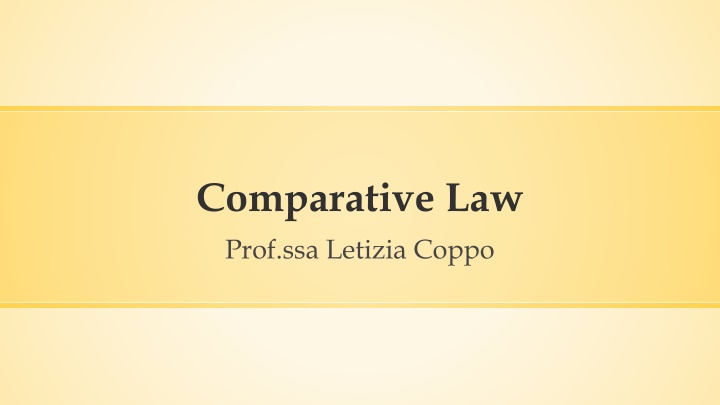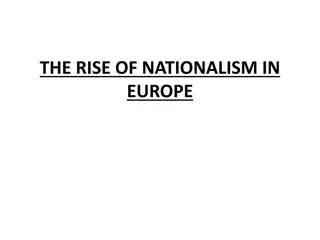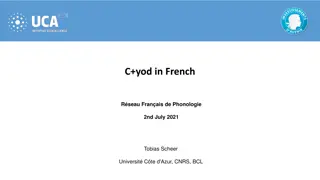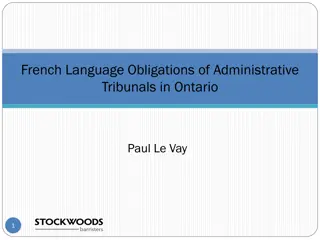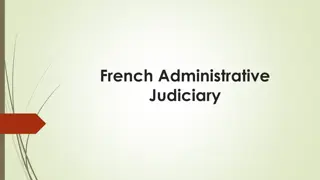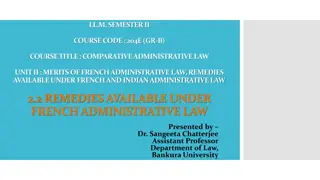Historical Origins and Development of French Law
The historical evolution of French law, from the Roman period through the influence of Barbarian kingdoms to the Medieval and Renaissance periods, showcasing the blend of Roman, Germanic, and customary law in different regions of France.
Download Presentation

Please find below an Image/Link to download the presentation.
The content on the website is provided AS IS for your information and personal use only. It may not be sold, licensed, or shared on other websites without obtaining consent from the author.If you encounter any issues during the download, it is possible that the publisher has removed the file from their server.
You are allowed to download the files provided on this website for personal or commercial use, subject to the condition that they are used lawfully. All files are the property of their respective owners.
The content on the website is provided AS IS for your information and personal use only. It may not be sold, licensed, or shared on other websites without obtaining consent from the author.
E N D
Presentation Transcript
Comparative Law Prof.ssa Letizia Coppo
THE ROMANISTIC LEGAL FAMILY FRENCH LAW
HISTORICAL ORIGINS FORMATION OF FRENCH LAW I. Roman period and Barbarian kingdoms Roman law was imported in Gaul and in the other territories conquered by the Roman Empire. After the fall of the Roman Empire (476 a.D.), came the rise of Barbarians kingdoms (Visigoths, Burgundians ). Different peoples with different origins living within the same territory; the law was based on personal statutes: everyone had to make a professio, declaring its origins and was subject to the corresponding law.
HISTORICAL ORIGINS FORMATION OF FRENCH LAW I. Roman period and Barbarian kingdoms Despite the fall of the Roman Empire and the rise of Barbarians kingdoms, Roman law survived, first of all as the personal law of non- Germanic peoples. Basically Germanic kingdoms used to live on customs, but they soon started enacting statutes, some of which recollecting such unwritten traditions, some others resuming Roman law.
HISTORICAL ORIGINS FORMATION OF FRENCH LAW I. Roman period and Barbarian kingdoms In the south of France, Alaric, king of Visigoths enacted the Breviarium Alaricianum or Lex Romana Wisigothorum (506 a.D.), containing a r sum of and a commentary on the Codex Theodosianum and other Roman sources. In the north of France, the king of the Franks enacted a series of statutes recollecting Germanic customs, the most important of which was Lex Salica.
HISTORICAL ORIGINS FORMATION OF FRENCH LAW II. The Medieval and Renaissance period The development of scientia juris in Italian universities (XI, XII century) had a strong impact on the South of France, in particular in the universities of Toulouse and Montpellier. France was thus divided 1. Southern France: the country of droit crit (written law) 2. Northern France: the country of droit coutumier (customary law)
HISTORICAL ORIGINS FORMATION OF FRENCH LAW II. The Medieval and Renaissance period The dichotomy between droit crit and droit coutumier must not be overestimated. In the South, the urban regions of Toulouse and Bordeaux there were customs mixing up Roman law and Germanic traditions In the North, some areas of the law were incompletely regulated, so Roman law was applied as a gap filler.
HISTORICAL ORIGINS FORMATION OF FRENCH LAW II. The Medieval and Renaissance period Reasons for the spread of Roman law: Roman law was adopted not because of its authority as a product of the Roman Empire, but, in the South because it was the local custom; in the North, because of its inherent quality. On the contrary, when Germany imported Roman law it was for reasons of prestige, which, unlike in France, soon lead to question the opportunity of a full reception.
HISTORICAL ORIGINS FORMATION OF FRENCH LAW II. The Medieval and Renaissance period Official records of regional customs: in the XIII century, several law practitioners wrote law books recollecting regional customs (La coutume de Paris, la coutume d Orl ans ). The method was the so called enqu te par turbe : a number of inhabitants referred about the substance of the local customs as they remembered them to be.
HISTORICAL ORIGINS FORMATION OF FRENCH LAW II. The Medieval and Renaissance period Criticalities: the proliferation of customs and the different cognition sources increased legal uncertainty. First solution: with Ordonnance de Montils-les-Tours of 1454, king Charles VII ordered the codification of all the customs and the revision of all the existing records and committed the task to a royal commission of experts.
HISTORICAL ORIGINS FORMATION OF FRENCH LAW II. The Medieval and Renaissance period Consequences The codification of customary law weakened the importance of Roman law and prevented the massive reception of it that would take place in Germany years after. The codification of customary law contributed in XVI century to the formation of a droit coutumier commun and to the amalgamation of customary law and written law.
HISTORICAL ORIGINS FORMATION OF FRENCH LAW II. The Medieval and Renaissance period Consequences The codification of the most relevant customs could not cancel all the divergences among them or remedy legal uncertainty. People felt the need of uniformity and the Parisian Parliament became the promoter of it, with its influential decisions and wide jurisdiction encompassing almost all the regions of droit coutumier.
HISTORICAL ORIGINS FORMATION OF FRENCH LAW II. The Medieval and Renaissance period Consequences: fundamental role of case-law In filling the gaps left by customary law, Parisian courts (Parlements) started elaborating uniform rules. The Coutume of Paris became the paramount one. The 1580 edition of the Coutume de Paris contained a Digest of the courts on general issues.
HISTORICAL ORIGINS FORMATION OF FRENCH LAW II. The Medieval and Renaissance period Consequences: fundamental role of practitioners The leading role in the development of the common law of France was played not by professors, but by practitioners (attorneys, legal advisors, judges and royal administrators). They first upheld the idea of a common law encompassing all the legal grounds on which the different customs were based.
HISTORICAL ORIGINS FORMATION OF FRENCH LAW II. The Medieval and Renaissance period Consequences: fundamental role of practitioners The most important character was Dumoulin, with his Commentary on the first book of the Coutume de Paris, that was mainly directed to discovering the general principles underlying all the customs through a constant comparison among them. Dumoulin assumed that gaps left by a custom should not be filled with Roman law, but with the closest custom.
HISTORICAL ORIGINS FORMATION OF FRENCH LAW II. The Medieval and Renaissance period Consequences: fundamental role of practitioners Development of a well-organised and therefore powerful group of practicing lawyers, allied with the king, interested in the centralisation of justice in the royal courts and devoted to national law. By XIV century, professional judges, trained in the law and coming from a bourgeois background had replaced the former nobles in the Court of Paris: their appointment on a permanent basis marked the birth of legal profession.
HISTORICAL ORIGINS FORMATION OF FRENCH LAW III. The age of lumi res and the French Revolution The XVII and XVIII are the centuries in which prominent French jurists like Domat, Pothier and Pascal planted the scientific seeds for the Napoleonic Code. They gave a great contribution to the systematisation of law, they put into the order suggested by the new ideas of natural law the rules of roman law adapted to the needs of the time. Their essays were of great lucidity and conceptual accuracy.
HISTORICAL ORIGINS FORMATION OF FRENCH LAW IV. The droit interm diaire The period between 1789 and the rise of Napoleon marked the fall of all the institutions on which the ancien r gime was grounded. The purpose of the revolution had been to free citizens from the traditional authority of the feudal system, church, family, guilds and social classes in name of libert , galit , fraternit .
HISTORICAL ORIGINS FORMATION OF FRENCH LAW IV. The droit interm diaire Main consequences on the law The Decrees of 1791 abolished all feudal servitudes, the privilege of primogeniture and all the other differences based on sex or age in the law of inheritance. As to property law, the main interest was to divide land as much as possible: this lead to the abolition of freedom of testament and donation; all had to get equal portions of land.
HISTORICAL ORIGINS FORMATION OF FRENCH LAW IV. The droit interm diaire Main consequences on the law Patria potestas was abolished; restraints on marriage provided by canon law were curtailed and the requirements to a valid marriage reduced to the minimum. Marriage was conceived as a contract which could be terminated by each of the spouses even on the grounds of an incompatibility of temper or character .
HISTORICAL ORIGINS FORMATION OF FRENCH LAW IV. The droit interm diaire Main consequences on the law Only civil marriages were lawful and the central register of civil status was created. Legitimate and illegitimate children recognised by their parents were equalled, save for marginal aspects concerning inheritance law. The aim was, however, to unify private law.
THE MAKING OF THE CODE NAPOLON After the several drafts by Cambac r s, Napoleon appointed a commission of 4 persons (expert practitioners, not academics) for the final draft of the French Civil code. 2 representatives of droit coutumier: Tronchet; Bigot de Pr ameneu 2 representatives of droit crit: Portalis; Maleville
THE MAKING OF THE CODE NAPOLON After only 4 months, the Draft was ready. The text was divided into sections submitted to the legislative process separately. On the 31stMarch 1804 the Code Civil des Fran ais was promulgated
THE MAKING OF THE CODE NAPOLON Ma vraie gloire n'est pas d'avoir quarante Waterloo effacera souvenir de victoires; ce que rien n'effacera, ce qui vivra ternellement, c'est mon Code civil gagn batailles; le de tant
THE MAKING OF THE CIVIL CODE The Code civil opened theAge of Codifications 1806 Code of Civil Procedure 1807 Commercial Code 1808 Criminal Code 1808 Code of Criminal Procedure
THE MAKING OF CODE NAPOLON Napoleon s role He was an elegant and refined man, but also a concrete man, a soldier. He put an abrupt end to hair-splitting discussions. He advocated a simple and transparent drafting style, capable of making concepts intelligible also to non-experts
THE MAKING OF THE CODE NAPOLON Napoleon s role He brought in the Code also his personal experience Idea of a strong patriarchal family to mirror the organisation of the State, with Napol on, as the father of the Nation, on top. Divorce for mutual consent (he divorced from Josephine Beauharnais)
THE SPIRIT AND ESSENTIAL FEATURES OF THE CODE NAPOL ON While Prussian and Austrian Codes were dictated by an enlightened despot, the French Civil code was a bourgeois Code, a product of the French Revolution. Nevertheless, it rested on a large number of traditional institutions, such as freedom of contract and ownership.
THE SPIRIT AND ESSENTIAL FEATURES OF THE CODE NAPOL ON The Code maintained some revolutionary achievements coming from droit interm diaire Equal division of estates Complete secularisation of marriage Abolition of feudal servitudes Prohibition of fideicommissary substitution
THE SPIRIT AND ESSENTIAL FEATURES OF THE CODE NAPOL ON But the Code resized and downsized several rules It reduced the grounds for divorce It re-established the freedom of testament and donation, but within the limits of the quotit disponible .
THE SPIRIT AND ESSENTIAL FEATURES OF THE CODE NAPOL ON The Code reached a reasonable and balanced compromise between droit crit and droit coutumier. Droit crit: contract law; law of wills; dowry, contractual property regime was nearly modelled on Roman law. coutumier: family and inheritance law; forced Droit inheritance of relatives; community of movables; possession vaut titre.
THE SPIRIT AND ESSENTIAL FEATURES OF THE CODE NAPOL ON Possible influence of natural law Without jusnaturalism the very idea of a code would not have developed. Spirit of moderation and wisdom. Judge as bouche de la loi and legislative ideology. No ambition of completeness: wide use of general clauses.
THE STRUCTURE OF THE CODE NAPOLON Preliminary title Publication, effect and application of the laws in general Book I. Persons Book II. Property, and the Different Modifications of Property Book III. The Different Modes ofAcquiring Property (see Annex 1)
THE HERITAGE OF THE CODE NAPOLON The wide use of general clauses and open formula is what allowed the Code civil to survive (see abus de droit; clauses exon ratoires de la responsabilit ; law of delicts). cole de l ex g se: grammatical and logical study of the Code. cole de la libre recherche scientifique: interpretation of the Code in light of the needs expressed by society.
THE REFORMS OF THE FRENCH CIVIL CODE 2006 Successions and liberalities 2004 Divorce 2005, 2009 Filiation 2006 Sureties 2007 Capacity to act; guardianship 2008 Statute of limitations 2013 Marriage (extension to same-sex partnerships) 2016 Obligations and contract law (seeAnnex III)
